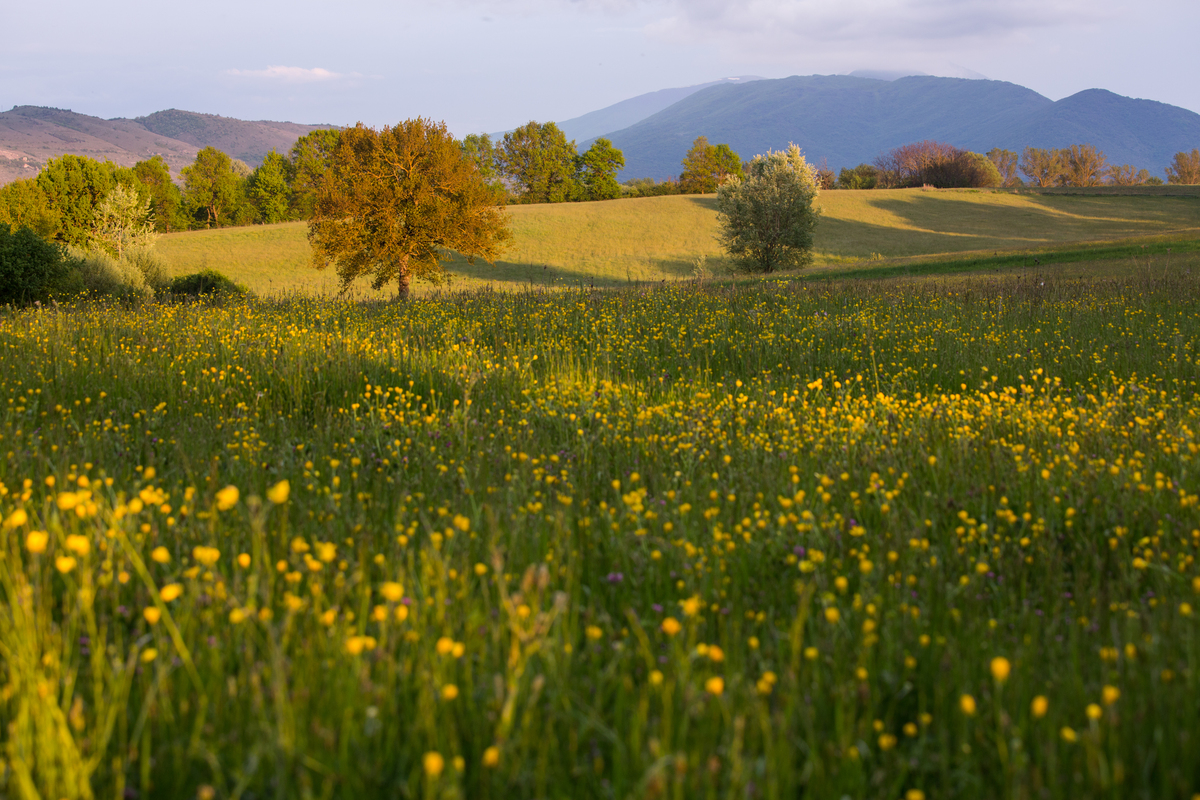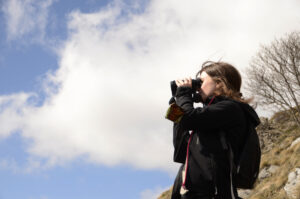Through volunteering and internship programs, Rewilding Apennines gives the opportunity to many young people to have professional and life experiences in direct contact with nature. This is Elena Viti’s story.

I am in Parma, sitting at the small desk in my studio in front of the computer. The window of my room looks out onto a dull white landscape, with buildings standing out against an empty sky. I started University of Agriculture a year ago, after a Bachelor’s in Economics, and I was thrilled to finally get back to using my manual skills and dirtying my hands with soil. The pandemic has changed life plans for everyone, and now I find myself following the pruning course on the computer… and I am bored to death.
But one thought keeps running through my head. I can’t help thinking back to the experience I had a few months earlier in a small village perched in Abruzzo ‘s mountains. In Pettorano sul Gizio, I was lucky enough to attend, for four intensive days, the Rewilding Economy Seminar, one of the most innovative seminars of recent times. As a student of Agri-food Economics, I was tired of constantly hearing terms such as “reduced environmental impact, sustainable development, recycling economy” emptied of their original meanings, used only as cunning marketing labels to catch the most sensitive consumers. Going back to concretely discuss about regeneration economies based on nature was like opening a window on new, greener, but above all, wilder horizons. In fact, the theme of the wild, and therefore of Rewilding, was thoroughly explored, linking it to coexistence, a concept hitherto unknown to me. Coexistence means recognising oneself as integral part of nature and not as something detached. It means leaving behind the anthropocentric individualism that places us alone at the centre of the universe. It means rediscovering that sense of wonder aroused by the apparently invisible connections that link our species to all others, from the largest to the most microscopic. It means thinking about ecosystems and landscapes not as something untouched and immutable, but in continuous transformation and dialogue with human activities. It means co-creating and co-thinking new possible worlds together with the countless forms of life that surround us.

Amid these considerations and on the brink of a mystical crisis, I decided to write to the Rewilding Apennines (RA) team, this time as an agricultural student. My interest was to learn more about the projects that were to be implemented in an agro-rewilding context.
In March, I returned to Pettorano, Italy’s first Bear Smart Community. Its peculiarity is to be located within one of the ecological corridors where RA intervenes with activities to mitigate conflicts between human communities and wildlife. In two of these corridors, I began mapping the agri-food businesses, with the aim of starting a future collaboration with RA. For two months, I conducted interviews with shepherds, farmers, breeders, but, most of all, beekeepers, gathering socio-demographic and structural information, and analysing their weaknesses and development potential. What initially looked like a simple data collection turned into biographies, fragments of life, tales of resistance and extreme attachment to the land. At times, this attachment aroused feelings of anger and frustration, at other times a certain nostalgia for times gone by, at other times a rediscovered peace and a renewed sense of wonder looking at a nature that is slowly and so spontaneously regaining space, offering greater biodiversity and better ecosystem services, hence a better quality of life.
In order to retrace some fragments of my experience in Abruzzo, I decided to use the five senses. The monotony and the sedentary nature of lockdown days had almost made me forget what it means to really feel and perceive things.
I linked the first day spent in Abruzzo to the touch. Unaware of what awaited me when I went on carcass “hunting” with the RA Field Officer, I found myself climbing a not exactly easy mountain, at least for my standards. Watching countless small stones on the slopes falling as I passed by, I had the feeling that I might end up the same way too, inexorably rolling down the valley. Here I was scrambling to cling to the occasional tuft of grass. My bare hands on the bare stone. “In these moments it is essential to remember you are bipedal”, Angela encouraged me. So, I learned to trust my feet, even on the steepest slopes. Most importantly, once I overcame the fear of looking up, I had the pleasure of making my first encounter with his majesty the griffon vulture.


I alternated between difficult challenges and softer moments of building electric fences in the farms. There was also the possibility to access some healthy pet therapy, cuddling donkey cubs, incredibly docile and at the same time proud and courageous animals. In fact, it is said that donkeys used to accompany shepherds into the mountains to defend their herd from wolves.

Speaking of shepherds, I couldn’t help thinking about the unforgettable taste of the variety of cheeses of Virginia, an ex-student in agriculture at Bologna who has decided to come back to her home town at Pacentro to do what gives her most joy. Here, each cheese acquires its own flavour, and, with a little training, it is even possible to recognise the different types of herbs the animals have eaten, that magically transfer their aroma to the milk. Spending time with her family, between a spoonful of still-warm fresh ricotta and a glass of wine at Alla Casa Vecchia, was like feeling at home.
When walking through wild and pristine places, smell is certainly one of the five senses, along with hearing, that is most sharpened. I can’t help but remember the amazing spring scent floating in the air in April, walking through olive orchards near the Monte Genzana Alto Gizio Natural Reserve.

Talking about sound, I associate it with the Gizio river’s incessant flowing in the industrial archaeology park of Pettorano, whose banks have been the site of idyllic picnics and Qi Gong lessons under the guidance of Antony, an artist who decided to settle down in the Bear Smart Community.
As for view, there’s not much to add, other than an invitation to discover breath-taking landscapes of ancient villages that have survived history, perched like cribs on steep, rocky mountains.

This experience has taught me a lot, giving me the opportunity to put myself in the shoes of an ecologist, deploying camera traps and monitoring the animal communities in the area. At times I felt like an activist, helping to build electrified fences. In other occasions I felt like a journalist, collecting the stories of those who live the area.
To explore what future and unusual relationships we can bring into play with the species that surround and accompany us on this journey, it will be essential to arm ourselves with creativity and empathy. As a student of agriculture and an ecology enthusiast, I leave this experience with a question: can what we eat become the starting point for a journey to reconnection with nature and the ecosystems that sustain us, saving endangered species? Perhaps this is a rather daring thought, but who better can promote conservation activities than native farmers, who have always lived in the area? They are the custodians of genetic resources, essential for a more peaceful coexistence with wildlife, as well as potential tools for adaptation to an incontrovertible climate change. They could become the pioneers of a Food Rewilding Movement, recreating the conditions for biodiversity to flourish again, not only in the wild, but also in the activities, which will perhaps be the link to reconnect humans with the land: agriculture.